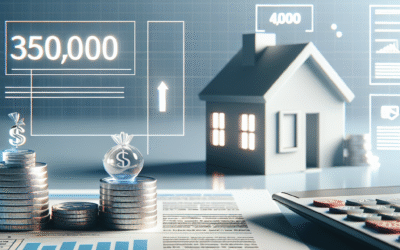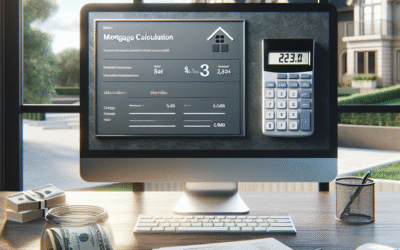Understanding 100 Mortgage Loans
What Are 100 Mortgage Loans?
100 mortgage loans are a specific type of financing that allows borrowers to purchase a home with little to no down payment. Unlike traditional mortgage options that typically require a down payment of 20%, 100 mortgage loans cover the entire purchase price of the home. This makes it an attractive option for first-time homebuyers or those who may not have significant savings.
Benefits of 100 Mortgage Loans
There are several key benefits associated with 100 mortgage loans:
- No Down Payment: The most significant advantage is that you can buy a home without needing to save for a down payment.
- Lower Closing Costs: Since you’re not putting down a large sum upfront, your closing costs may be lower.
- Homeownership Accessibility: This type of loan makes it easier for individuals and families to enter the housing market, especially in high-cost areas.
- Potential for Higher Loan Amounts: As you’re financing 100% of the home’s value, you may qualify for a larger loan compared to conventional loans that require a down payment.
Eligibility Requirements for 100 Mortgage Loans
Credit Score Considerations
To qualify for 100 mortgage loans, lenders typically require a good to excellent credit score. Most lenders look for scores of at least 620, but higher scores can lead to better interest rates. If your score is below this threshold, it may be challenging to secure a loan.
Income and Employment Criteria
Stable employment and a reliable income source are crucial for approval. Lenders usually require:
- Proof of consistent income (pay stubs, W-2 forms, or tax returns for self-employed individuals).
- A debt-to-income ratio (DTI) of 43% or lower, meaning your monthly debt payments should not exceed 43% of your gross monthly income.
Types of 100 Mortgage Loans
Fixed-Rate 100 Mortgage Loans
Fixed-rate 100 mortgage loans offer a stable interest rate throughout the life of the loan, making monthly payments predictable. This is ideal for buyers who prefer consistency in their budgeting and want to avoid fluctuations in interest rates.
Adjustable-Rate 100 Mortgage Loans
Adjustable-rate 100 mortgage loans typically start with a lower interest rate that may change after an initial period, usually 5, 7, or 10 years. This option can be beneficial if you plan to sell or refinance before the rate adjusts, but it does carry the risk of increased payments later.
How to Apply for 100 Mortgage Loans
Documentation Needed
When applying for a 100 mortgage loan, be prepared to provide various documents, including:
- Proof of income (pay stubs, tax returns).
- Identification (driver’s license, social security number).
- Bank statements for the last few months.
- Any additional documentation requested by the lender.
Steps in the Application Process
- Pre-Approval: Start by getting pre-approved to know how much you can borrow.
- Application Submission: Complete the application with all required documentation.
- Underwriting: The lender will review your financial information to determine eligibility.
- Closing: If approved, you’ll finalize the loan terms and sign documents.
Common Myths About 100 Mortgage Loans
Debunking Misconceptions
Many people believe that 100 mortgage loans are only for low-income individuals or that they come with excessively high-interest rates. In reality, these loans are available to a wide range of borrowers, and interest rates can be competitive.
Realities of 100 Mortgage Loans
It’s essential to understand the terms and conditions. While 100 mortgage loans provide benefits, they may also come with stricter qualification criteria and potentially higher monthly payments compared to lower loan-to-value loans.
Comparing 100 Mortgage Loans with Other Loan Types
100 Mortgage Loans vs. FHA Loans
FHA loans require a minimum down payment of 3.5%, making them different from 100 mortgage loans. However, FHA loans are often available to those with lower credit scores and may have more flexible debt-to-income ratios.
100 Mortgage Loans vs. Conventional Loans
Conventional loans typically require a down payment, with the most favorable terms reserved for those putting down 20%. In contrast, 100 mortgage loans eliminate the need for a down payment, making them more accessible for some buyers.
Frequently Asked Questions About 100 Mortgage Loans
What is the Interest Rate for 100 Mortgage Loans?
Interest rates for 100 mortgage loans can vary based on market conditions and your credit score. It’s advisable to shop around and compare rates among different lenders.
Can I Refinance a 100 Mortgage Loan?
Yes, you can refinance a 100 mortgage loan, but the terms will depend on your credit score, market conditions, and equity in your home.
Are 100 Mortgage Loans Available Nationwide?
Yes, many lenders offer 100 mortgage loans across the United States, though specific terms and availability can vary by state.
How quickly can I close on a 100 Mortgage Loan?
Closing times can vary, but typically range from 30 to 45 days, depending on the lender and the complexity of your application.
What types of properties are eligible for 100 Mortgage Loans?
Single-family homes, townhouses, and some condominiums are generally eligible. However, investment properties and vacation homes often are not.
Are there any additional fees with 100 Mortgage Loans?
Yes, there may be additional fees, including origination fees, appraisal fees, and title insurance. Always review the loan estimate provided by your lender for a complete breakdown.
Conclusion on 100 Mortgage Loans
100 mortgage loans are an excellent option for those looking to purchase a home without a down payment. With various types available and competitive benefits, they provide accessibility to homeownership for many individuals and families. Understanding the eligibility requirements and application process can help you make an informed decision about whether a 100 mortgage loan is right for you. For more information on mortgage options, consider consulting with a financial advisor or visiting HUD.gov for resources on home buying.




0 Comments